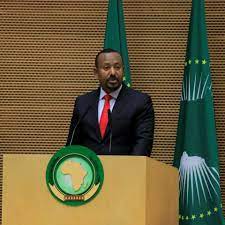

In a significant address during the celebration of Ethiopian Armed Forces Day, Prime Minister Abiy Ahmed firmly denied any intentions of resorting to the use of force to secure access to the Red Sea Port. This statement follows Ethiopia’s unsuccessful attempts to enter negotiations with neighboring countries Eritrea, Somalia, and Djibouti regarding access to this vital maritime passage.
Prime Minister Abiy Ahmed delivered his speech before a gathering of military personnel and government officials at the Armed Forces Square, declaring, “There is nothing that Ethiopia wants to achieve by force and invasion.”
This statement marked a notable departure from a previous televised statement by the Ethiopian leader, in which he had hinted at the use of all means necessary to secure access to the Red Sea, citing Ethiopia’s historical rights to these waters.
The Prime Minister’s speech comes at a time of heightened tensions and diplomatic challenges within the region.
Ethiopia has been unable to persuade its neighboring countries, Eritrea, Somalia, and Djibouti, to engage in negotiations that would grant it access to the Red Sea Port. These countries have thus far resisted Ethiopia’s appeals for dialogue on this matter.
This latest development has raised concerns and skepticism among some in the international community, given the complexities and historical animosities in the region.
The dispute over access to the Red Sea Port adds to the ongoing tensions in Ethiopia’s relationships with its riverine neighbors, Sudan and Egypt, particularly in relation to the Grand Ethiopian Renaissance Dam (GERD). Negotiations regarding the GERD continue, but a resolution remains elusive.
In response to Prime Minister Abiy’s remarks, an individual identified as Vendetta193075 expressed skepticism and frustration, stating, “Nobody cares anymore; as Eritreans, we will always be on our guard. Your prime minister’s or generals’ words mean nothing to us. Your untrustworthy prime minister screwed up big time, and nothing will ever be the same again.”
more recommended stories
 Somaliland’s Berbera Industrial Park: A New Era of Investment and Job Creation
Somaliland’s Berbera Industrial Park: A New Era of Investment and Job CreationThe Government of Somaliland, under the.
 President Irro’s Landmark Visit to UAE: A Diplomatic and Economic Win for Somaliland. Dubai, UAE – Somaliland’s Diplomatic Breakthrough
President Irro’s Landmark Visit to UAE: A Diplomatic and Economic Win for Somaliland. Dubai, UAE – Somaliland’s Diplomatic BreakthroughBy: Abdi Jama President Dr. Abdirahman.
 Kenya’s Unjustifiable Interference in Sudan: A Grave Violation of International Law and Regional Stability
Kenya’s Unjustifiable Interference in Sudan: A Grave Violation of International Law and Regional StabilityBy: Abdi Jama Kenya’s continued meddling.
 𝗙𝗼𝗿𝗺𝗲𝗿 𝗣𝗿𝗲𝘀𝗶𝗱𝗲𝗻𝘁 𝗠𝘂𝘀𝗲 𝗕𝗶𝗵𝗶’𝘀 𝗥𝗲𝗰𝗸𝗹𝗲𝘀𝘀 𝗔𝗰𝘁𝗶𝗼𝗻𝘀 𝗠𝘂𝘀𝘁 𝗡𝗼𝘁 𝗕𝗲 𝗜𝗴𝗻𝗼𝗿𝗲𝗱 – Abdihalim Musa
𝗙𝗼𝗿𝗺𝗲𝗿 𝗣𝗿𝗲𝘀𝗶𝗱𝗲𝗻𝘁 𝗠𝘂𝘀𝗲 𝗕𝗶𝗵𝗶’𝘀 𝗥𝗲𝗰𝗸𝗹𝗲𝘀𝘀 𝗔𝗰𝘁𝗶𝗼𝗻𝘀 𝗠𝘂𝘀𝘁 𝗡𝗼𝘁 𝗕𝗲 𝗜𝗴𝗻𝗼𝗿𝗲𝗱 – Abdihalim MusaYesterday, Somaliland witnessed a deeply troubling.

